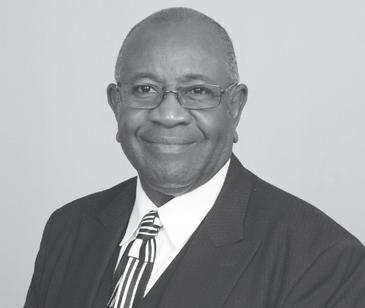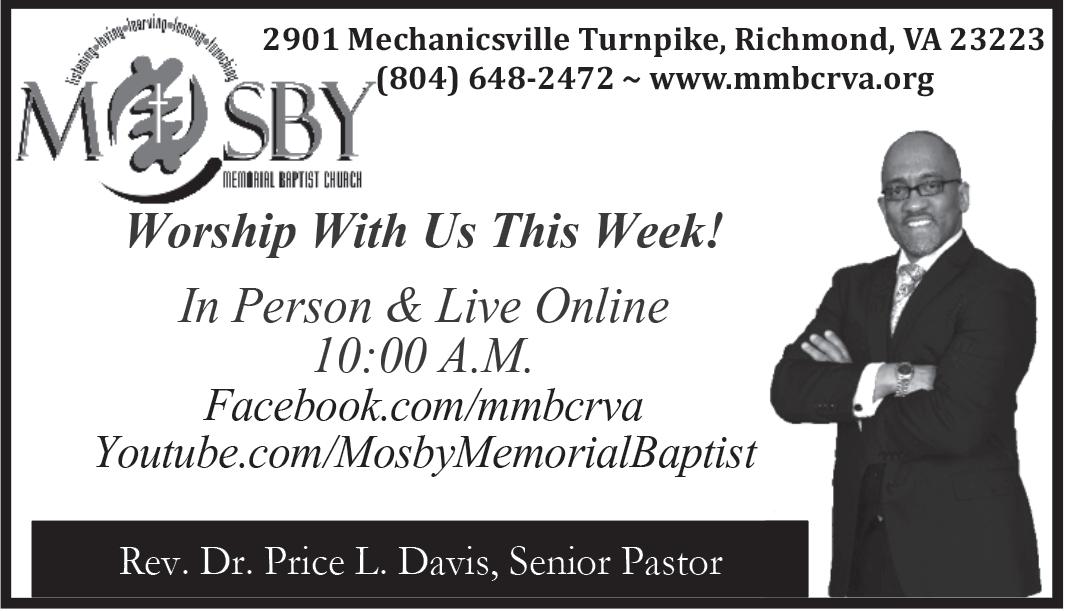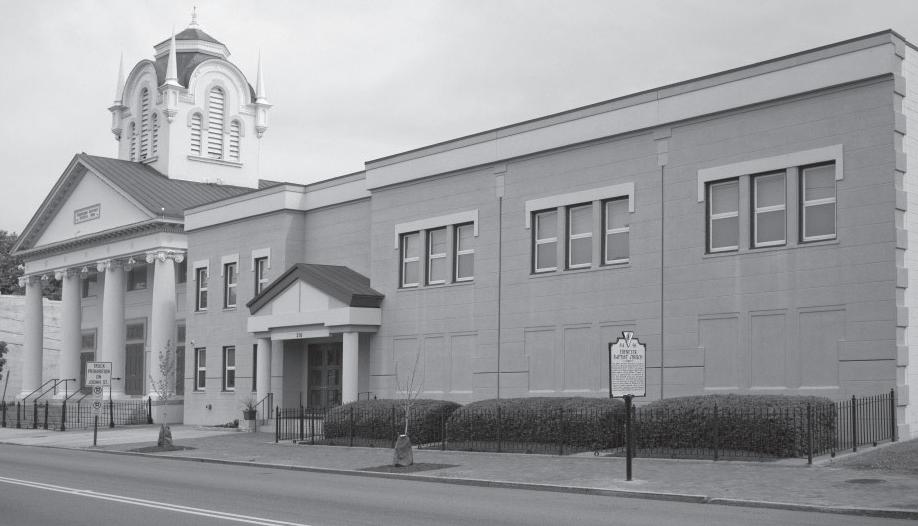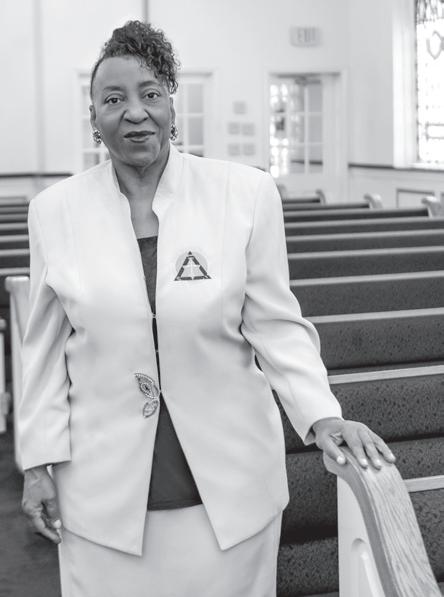




By Markus Schmidt
U.S. Rep. Jennifer
McClellan,
D-4th, is pushing back against Gov. Glenn Youngkin’s recent claims that all 2,500 immigrants detained in statewide operations since March were violent offenders, saying Monday she doesn’t believe it — and won’t — until the administration provides proof.
“Until you show me that all 2,500, all of their cases, what they were convicted of … you are innocent until proven guilty,” McClellan told The Mercury after meeting with courthouse staff, advocates and attorneys at the Chesterfield County Courthouse, where Immigration and Customs Enforcement (ICE) officers have conducted ongoing raids.
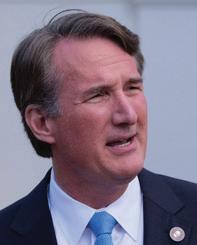
McClellan stopped short of directly accusing Youngkin of lying, but she made clear her doubts.
“I would say officials in the Trump administration are not telling the truth in 100% of the cases,” she said. “I think the governor either is not doing his due diligence to ask the right questions and is just parroting what he has been told — at best.”
McClellan’s comments came as part of a broader rebuke of current immigration enforcement tactics in Virginia — including federal-only ICE operations like the courthouse raids and the parallel efforts of Youngkin’s Virginia Homeland Security Task Force.
“I heard stories today about people who were detained when they came for their arraignment, so they haven’t been convicted
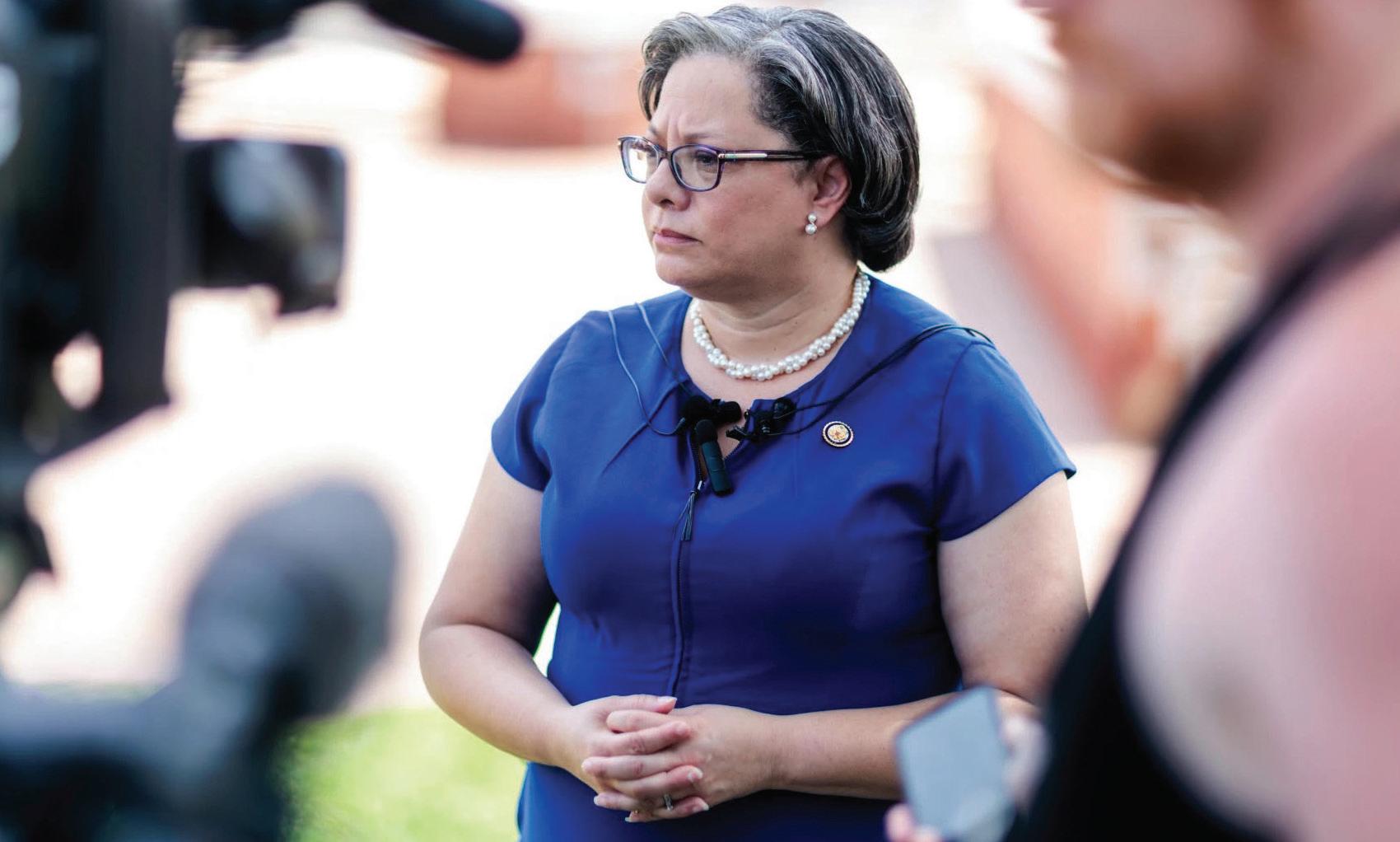
By George Copeland Jr.
The Richmond City Council voted Monday to require top city officials to live within city limits and to impose new zoning restrictions on tobacco and vape shops, approving both measures unanimously during its latest meeting.
The city residency ordinance, introduced by 4th District Council member Sarah Abubaker, requires several senior officials — including the chief auditor, department directors, and the inspector general — to live in Richmond while employed. Initially met with pushback from Mayor Danny Avula and his administration, the measure gained their support by the time of its passage, which they praised in a statement released shortly after the meeting concluded. The approved ordinance includes an amendment allowing employees facing certain circumstances or hardships to seek a waiver from the residency requirement. Their appointing authority will determine eligibility and approve requests. The chief administrative officer must also provide quarterly reports to the City Council on

shops, limiting where they can open in relation to existing stores, schools, parks, libraries and places of worship.
the number of waivers requested and granted.
“Tonight’s residency vote strengthens our ability to build the kind of City Hall
Richmonders deserve,” Chief Administrative Officer Odie Donald said in the statement.
“Richmond is full of homegrown talent, and part of my

job is tapping into that strength
By George Copeland Jr.
The Richmond City Council is questioning if the Richmond Redevelopment Housing Authority (RRHA) followed the law in its plans to redevelop the city’s oldest public housing neighborhood. Council members unanimously passed a resolution this week alleging the group broke state law when RRHA CEO Steven Nesmith signed a redevelopment agreement for Gilpin Court.
The resolution, introduced by 3rd District Council member Kenya Gibson, cites sections of Virginia housing authorities law barring construction contracts and redevelopment plans until approval “by the governing body” of the locality, and argues the signed agreement qualifies.
“The law is very clear that before
By Graham Moomaw
Gov. Glenn Youngkin is threatening to withhold state funding from Richmond until the city pays the $5.8 million the governor says the city owes to a man who spent 45 years in prison for a crime he didn’t commit.
Last year, Marvin Grimm — who was convicted in 1976 — was formally exonerated of the charge that led him to spend most of his life in prison. According to a letter Youngkin sent Mayor Danny Avula last week, the city has not yet paid Grimm the millions he’s owed for his ordeal.
“The background that led to Mr. Grimm’s wrongful imprisonment is horrific,” Youngkin wrote to Avula. “In order to secure a conviction, employees of the city did illegal and despicable things to a human being and a fellow citizen of Richmond.”
On Tuesday, Mayor Danny Avula sent Youngkin a letter saying the city “intends to move toward a complete resolution of the matter shortly.”
“The legislation referenced in your letter is new as of July 1, and as you are aware, imposes a significant financial obligation on the city of Richmond,” the mayor wrote to the governor. “We are currently reviewing the unfortunate circumstances of Mr. Grimm’s incarceration and the city is fully reviewing the matter and subsequent legislation.”
Richmond police arrested Grimm and linked him to the death of a 3-year-old boy who had disappeared from an apartment complex and was found in the James River. Grimm successfully proved his innocence decades later, making his wrongful incarceration case the longest in Virginia history and one of the longest in U.S. history.
Grimm confessed to the murder and sexual assault of the boy. He later recanted his confession, insisting he was innocent and had been coerced into pleading guilty in order to avoid the

Free Press staff report
Tanikia Jackson has been appointed as the City of Richmond’s new Deputy Chief Administrative Officer for Finance and Administration, city officials announced recently. Her first day on the job is scheduled for Aug. 11.
Jackson brings more than 20 years of experience in government finance, operations and strategic planning within municipal public sectors across the Southeast.
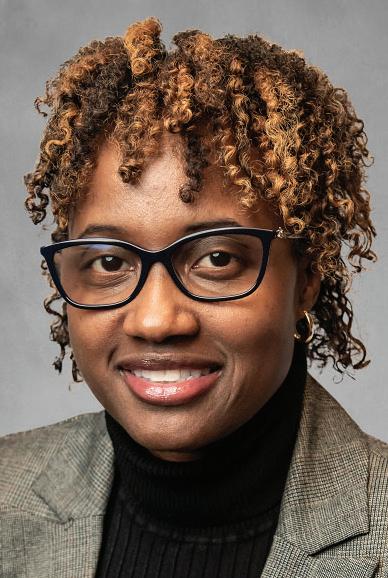
She most recently served as Deputy Chief of Staff for the City of Atlanta, where she oversaw budget, procurement, and infrastructure operations. Her previous roles include Deputy Chief Financial Officer for Chattanooga, Tennessee, and leadership positions in Georgia’s DeKalb County and Augusta-Richmond County.
“I am honored to join the City of Richmond and contribute to a community that’s full of momentum and meaningful work,” Jackson said. “I look forward to working alongside the city’s leadership to strengthen our finance and administration functions, the backbone that supports the programs and services making a real difference in people’s lives.”
Jackson will provide strategic oversight for internal and external administrative operations. Her portfolio will include Budget and Strategic Planning, Citizen Service and Response, Finance, Human Resources, Information Technology, General Services and Procurement.
“Ms. Jackson has a proven track record of best-in-class municipal finance and administrative leadership,” said Odie Donald, chief administrative officer.
Mayor Danny Avula said Jackson’s leadership will be key to strengthening the foundation of a thriving Richmond. “She brings the experience, vision and desire to take on this role and keep us moving forward,” Avula said.
During her time in Atlanta, the city achieved its highest-ever credit rating, a Triple-A bond rating from Fitch. Jackson also managed a $34 million executive office budget, oversaw Atlanta’s first nightlife study and supported the creation of a new Nightlife Office.
Jackson began her public service in the U.S. Air Force, serving six years on active duty with global deployments and a special assignment in Washington, D.C. She holds a master’s degree in public administration from Keller Graduate School of Management and a bachelor’s degree in computer information systems from DeVry University.
Free Press staff report
The City of Richmond will begin rolling out an advanced traffic signal system this fall aimed at improving public transit service and emergency response times.
The Department of Public Works announced plans to launch a Centralized Transit Signal Priority (TSP) and Emergency Vehicle Preemption (EVP) project using Econolite Centracs Priority software. The system will allow GRTC buses and emergency vehicles to communicate directly with traffic signals, extending green lights or changing reds to greens in real time.
The effort builds on more than a decade of upgrades that linked all 490 signalized intersections in the city to a centralized transportation management system. The new software will enhance that network by connecting it to the GRTC Operations Center and the city’s Emergency 911 Call Center.
Up to 150 intersections will initially be outfitted with the technology, which city officials say will make Richmond one of the most advanced cities in the country for integrated traffic signal management.
The goals of the project include improving reliability for the city’s fare-free bus network, speeding up fire department response times and reducing delays for pedestrians, cyclists and drivers.
“Reliable transit is the backbone of an equitable city,” said Sheryl Adams, CEO of GRTC. “The Centracs Priority system ensures our buses keep to their schedules, connecting Richmonders to jobs, healthcare and opportunities without delay.”
Richmond’s bus ridership has increased 17% since 2018. In June, ConsumerAffairs ranked the city fourth in the nation for public transportation.
The Department of Public Works plans to roll out the project in phases. System design and integration is scheduled to begin in fall 2025, with full deployment and testing set for spring 2027.
“Giving priority to transit and emergency vehicles improves access to services and reinforces our public safety mission, while also advancing our sustainability goals,” said Dironna Moore Clarke, deputy director of Public Works and administrator of the Office of Equitable Transit and Mobility.
City Transportation Engineer Michael B. Sawyer called the project a “game-changer” for Richmond.
“By integrating cuttingedge technology, we’re not just improving transportation safety—we’re building a safer, more equitable city,” he said.
For the Richmond Fire Department, the system is expected to help reduce response times.
“Every second counts when lives are on the line,” said Interim Fire Chief Jeffrey Segal. “This technology clears the way for our crews, ensuring we can reach emergencies faster and save more lives.”

By George Copeland Jr.
State Democrats, former Gov. L. Douglas Wilder and the Virginia NAACP are speaking out against what they describe as politically motivated federal investigations
followed the opening of multiple investigations by the Department of Justice into George Mason University and its president, Gregory Washington, alleging antisemitism and discriminatory admissions, scholarships and hirings. GMU leadership has
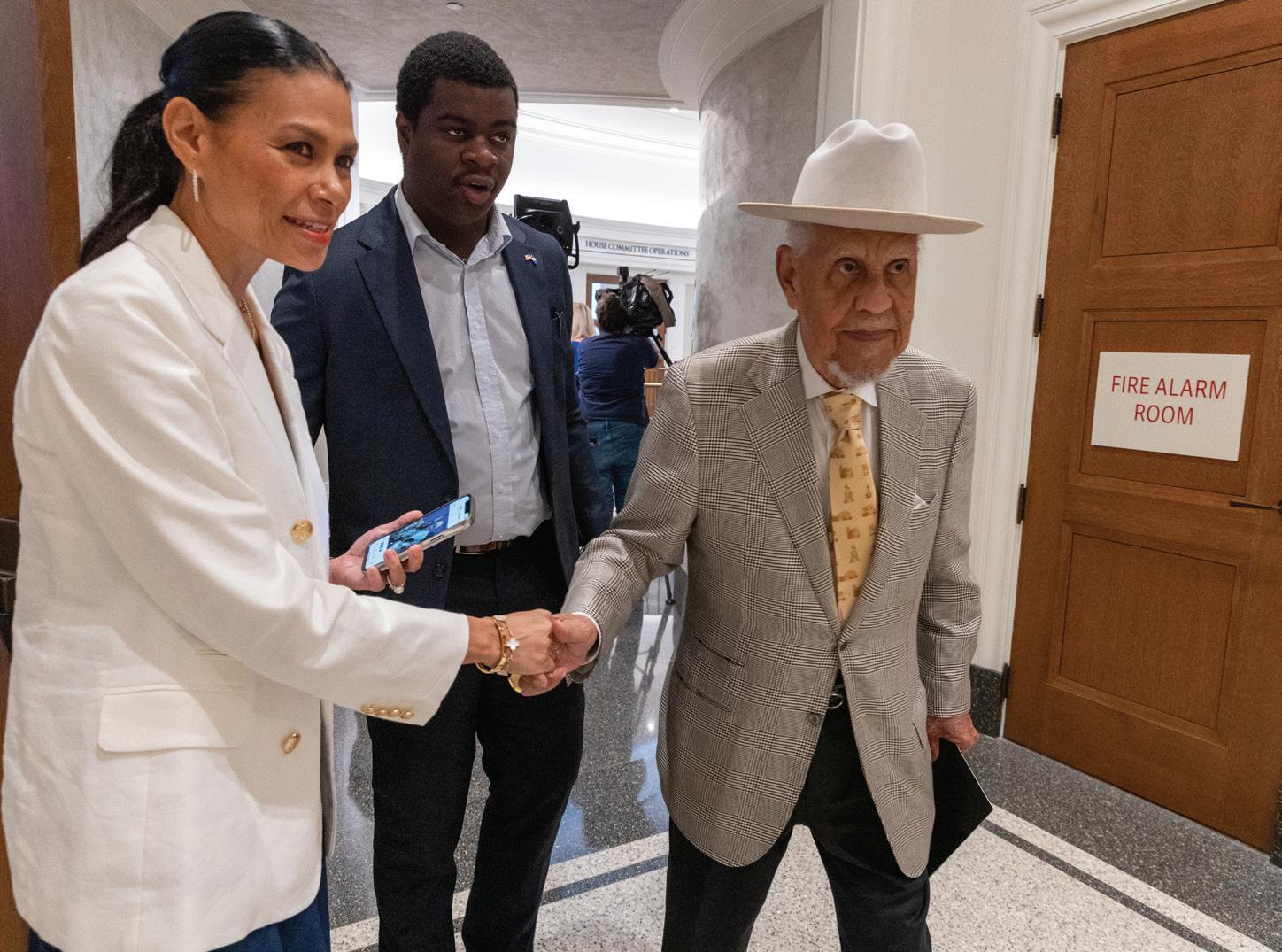
and partisan interference in the leadership of Virginia’s colleges and universities.
“What we’re seeing today is not a matter of policy differences — it’s a pattern, a coordinated effort to silence, punish and erase,” Wilder said during a press conference with state Democrats at the General Assembly Building on July 24.
The press conference on outside influence in Virginia’s public universities
promised cooperation with the investigations but has disputed the allegations. Democratic leaders denounced the investigations as the latest example of baseless, partisan targeting of successful institutions. They pointed to University of Virginia President Jim Ryan’s resignation following a separate DOJ probe, the nonrenewal of Virginia Military Institute Superintendent Cedric Wins’ contract, and

widespread leadership changes at state universities under Gov. Glenn Youngkin’s administration.
Similar criticisms were made during a Virginia NAACP press conference earlier that day outside the Fairfax County Courthouse.
“The Virginia NAACP is laser-focused on the travesty of the so-called DOJ investigation of GMU and Dr. Greg Washington and labels it the witch hunt that it truly is,” Virginia NAACP President Cozy Bailey said. “We will continue to call out the governor and federal entities in this latest attempt to undermine our institutions of higher learning here in the Commonwealth and across the nation.”
Along with voicing their support for Virginia’s universities and criticisms of outside influence, state Democratic leaders shared plans to address college operations and their relationship to state leadership to prevent similar issues in the future.
With fall elections poised to reshape Virginia’s political landscape, Democrats emphasized the need to reevaluate the Youngkin administration’s influence over state colleges and the current process for appointing university leadership.
“This is the time now to make sure that we’re protecting our students, we’re protecting our Commonwealth,” House Speaker Don Scott said. “These people are hurting our institutions, and we have a responsibility now to take another look at it.”
In response to the Democrats’ press conference, Youngkin’s spokesperson, Peter Finocchio, said “there is no place for antisemitism” on college campuses or for racial preferences in admissions or hiring.
“We must follow the law as established by the Supreme Court and federal laws, including civil rights statutes,” Finocchio said.
Last week, the Virginia Department of Motor Vehicles and the City of Richmond unveiled a 54-foot bright yellow ladder beside The Diamond to illustrate the force pedestrians experience when struck by a vehicle. According to the campaign, a person hit by a car going 40 mph suffers the same impact as being pushed from the top of the five-story structure.
“Speeding was a factor in more than 400 traffic deaths in Virginia last year,” said Virginia Secretary of Transportation W. Sheppard Miller III. “Every driver has a responsibility to understand the real impact of their decisions behind the wheel. This campaign puts the stark reality of those consequences front and center, urging everyone to slow down, follow the speed limit, and save lives.”
The display features a video of a climber scaling the structure, with speed markers indicating the equivalent fall distance for crashes at 10, 20, 30 and 40 mph. The campaign aims to make the physics of speed more relatable for drivers.
“This campaign makes the invisible visible,” said DMV Commissioner Gerald Lackey, the Governor’s Highway Safety Representative. “We’re taking the science of impact and turning it into something drivers can feel in their gut — because that’s how we change behavior.”
In 2024, 410 people died in speed-related crashes across Virginia, including 10 fatalities in the City of Richmond.
“In Richmond, we’re committed to making our streets safer for everyone — whether you’re behind the wheel, on a bike or on foot,” said Mayor Danny Avula. “If this display gets even one person to slow down and save a life, it’s worth every foot, because a thriving city starts with safe streets.”
The ladder installation was conceptualized by Two Tango Collaborative, designed by Barker Designs and built by BrandSafway Scaffolding Systems.

Becoming a homeowner sets your next generation up for success—that’s powerful. And it’s possible. Through guidance for first-time homebuyers and assistance programs, Truist can help make homeownership real—for you and your family.
• Down payment grants and assistance programs available1
• Mortgage options with 0 – 3% down2
• Loan options to help first-time buyers
• Knowledgeable support from the day you apply until your mortgage is paid Call 855-630-5377 to connect with a
help secure your future.
Continued from A1
and they haven’t had their trial,” she said. “I want details. And until the administration provides them, because … we know they have lied in certain instances, I won’t believe what the governor has to say.”
While the Chesterfield arrests are not part of the task force, McClellan linked them as symptoms of a state and federal immigration system that she said increasingly violates due process and fosters fear among communities of color.
Last week, the Richmond Democrat introduced legislation, H.R. 4703, that would require the U.S. Department of Homeland Security to track and publicly report every instance where U.S. citizens or lawful permanent residents are detained or deported for immigration enforcement purposes. While the bill’s full text is not yet available, McClellan said its goal is to create transparency and prevent wrongful removals.
“We know that citizens and people lawfully present have been detained and deported, primarily because of the great reporting from the press,” she said. “But we don’t know how many, we don’t know all the circumstances, so this is part of my oversight responsibilities.”
On Monday, McClellan visited the Chesterfield courthouse at the invitation of Circuit Court Clerk Amanda Pohl, who said she was alarmed by what the courthouse staff has witnessed over the last month.
“We are not getting any of the names, we’re not getting anything like that,” Pohl said of the individuals detained inside the courthouse. “What we’re seeing at the General District Court is that people are coming in for traffic violations, for minor offenses. They’re trying to have their day in court, and ICE is taking them.”
Pohl said at least 16 people were detained by ICE agents during a single week in June and that federal activity at the courthouse has continued since then — though more sporadically.
“We saw somebody come in, who had a charge. His case was continued. He had no other prior convictions, and he was still taken by ICE. He didn’t even get to have his day in court, and he was still taken from his family,” she said. “From what I understand, that gentleman was deported very quickly.”
A spokesman for ICE on Monday did not respond to a request for comment about the agency’s ongoing operations in Chesterfield.
Youngkin has repeatedly stood by the arrests carried out by ICE and those under the Homeland Security Task Force — a state initiative created earlier this year to work in coordination with federal partners, including ICE — and has insisted that all detainees are dangerous criminals.
“They should be arrested,” the governor said earlier this month, defending the task force’s mission. “These are folks that are here illegally and they’ve committed crimes.”
But McClellan said the absence of supporting data makes such blanket characterizations irresponsible and dangerous.
“Nobody knows the details around it,” she said. “That is creating fear that we have seen among communities of color, particularly in the Spanish-speaking community or anybody who’s brown.”
Virginia Attorney General Jason Miyares, who has championed the task force and joined Youngkin in calling for tougher immigration enforcement, last week declined to provide evidence backing up the administration’s “violent offender” claims when asked by The Mercury.
McClellan said what’s happening in Chesterfield and across the state goes far beyond any single program — and is undermining trust in law enforcement and the courts.
“We’re seeing people who aren’t showing up to get marriage licenses, who aren’t showing up to report crimes, to press charges, to testify, because they’re afraid, ‘Am I going to be disappeared

Continued from A1
Council members also approved restrictions for opening tobacco and hemp stores citywide, with a specific focus on limiting their density. The approved ordinance bars the creation of any new store within 1,000 feet of any existing vape shop, residential zone district, K-12 school, children day center, park, public library or place of worship.
The ordinance was first developed during Mayor Levar Stoney’s administration and was added to the agenda for a vote during the Council’s informal session earlier in the day at the request of Council Vice President Katherine Jordan, who said additional legislation is planned to address existing stores.
“It’s spanned two mayors, and the Planning Department worked diligently to make sure that we were doing a paper that hopefully we could absolutely enforce,” Jordan said. “This is an important first step.”
The Council also approved raising the exemption threshold for business, professional and occupational license taxes from $250,000 to $500,000. In addition, it authorized a performance agreement between the city, Virginia Public Media and the Richmond Economic Development Authority for a tax rebate tied to the construction of a new VPM headquarters in the Arts District. Other notable ordinances and resolutions, including measures to establish policies and procedures for the Civilian Review Board and to create a rental inspection program, were continued to meetings in September.
even though I’ve done nothing wrong?’” she said. “It is not making our communities safe. It’s having the opposite effect.”
McClellan said she’s heard from translators who are now afraid to appear in court, and domestic violence advocates who say victims are staying silent out of fear.
“It’s hard enough to get someone to step forward who has been domestically or sexually abused,” she said. “I’m hearing instances of all of that in the Richmond region, and it is concerning.”
McClellan also raised alarm over ICE agents reportedly wearing face coverings and refusing to identify themselves.
“All law enforcement agents, including immigration agents, need to be able to show their face and their badge or their identification,” she said. “If you can’t see their face, you don’t have their identification, you can’t hold them accountable, and that person cannot enforce their own civil rights. And that is dangerous.”
While the Chesterfield raids are not tied to Youngkin’s task force, McClellan said the impact is the same — a culture of fear driven by racial profiling and mass enforcement, not public safety.
“There are people who have been in this country, in some cases for decades, who may have been lawfully present when they first got here or who may be on a path to citizenship,” she said. “There are refugees from Afghanistan who worked with the U.S. government. There are many reasons why someone may lack documentation today. That doesn’t make them criminals.”
McClellan emphasized that immigration violations are civil offenses — not crimes — and said conflating them with criminal law is misleading.
“Being an undocumented immigrant is not a crime,” she said. “And the dehumanization that this administration is doing — trying to paint with a broad brush every undocumented immigrant, and U.S. citizens, that they are hardened criminals — is wrong and is un-American.”
Recent analysis by Stateline adds further context to McClellan’s concerns: Fewer than half of the nearly 112,000 ICE arrests made nationwide between Jan. 20 and late June were of convicted criminals — just 40 % — far lower than the 53% rate during the same period under the Biden administration.
The share of those arrested with violent crime convictions shrank from 10% to 7%, while arrests tied to drug convictions fell from 9% to 5%.
At the same time, the number of detainees without any criminal record nearly tripled, rising from roughly 47% to 60% of ICE arrests, most commonly for minor traffic or immigration violations. McClellan’s demands for data and due process protections align with these national trends, as critics argue the enforcement push increasingly sweeps up individuals who lack serious criminal histories.
Pohl said she invited several local officials, nonprofit leaders and attorneys to Monday’s meeting, including Sheriff Karl Leonard, who runs the Chesterfield County jail. “Unfortunately, we didn’t get a response,” she said. “But I’m sure he has other obligations.”
Pohl also emphasized that her office does not coordinate with ICE or the Sheriff’s Office and is not participating in enforcement. “Sheriff Leonard and I do not collaborate around this issue … but we have made it very clear: We’re not assisting ICE,” she said.
Leonard also did not respond to requests for comment Monday.
For McClellan, the current moment echoes dark chapters of American history.
“This is very reminiscent, to me, of the backlash to Reconstruction, when Confederate iconography was placed at courthouses in an effort to intimidate certain communities,” she said. “That intimidation is happening here, too, to brown people. It is wrong. It is very reminiscent of what we saw in Nazi Germany.”
As Virginia’s first Black congresswoman and a longtime civil rights attorney, McClellan said her concerns are rooted in protecting the constitutional rights of all residents.
“I think there are ways that we can invest in processing immigration cases in a much better way,” she said. “But I think the way not to do it is to dehumanize people. And what the Trump administration is doing is dehumanizing the immigrant community, whether they are citizens or not, including children. And that is wrong.”
This story originally appeared on VirginiaMercury.com.
Youngkin threatens to cut Richmond funding over $5.8M owed to wrongfully convicted man
Continued from A1
death penalty. Due to numerous problems with the prosecution — including suppression of evidence that undermined the case — Grimm won a writ of actual innocence from the Virginia Court of Appeals in 2024. After being denied parole dozens of times, he was paroled in 2020 but continued to pursue his innocence claim.
With help from the Innocence Project and the Arnold & Porter law firm, Grimm presented the court with new evidence showing that hairs linking him to the crime didn’t come from the boy, that DNA crucial to the prosecution didn’t come from him and that the timeline laid out by prosecutors didn’t align with evidence showing high levels of alcohol and drugs in the boy’s system.
Attorney General Jason Miyares supported Grimm’s innocence claim, hailing the case as “a textbook example of why Virginia provides actual innocence relief.”
A torn shoe belonging to Grimm was also a key piece of evidence in the case, even though testing at the time found no soil or debris indicating the shoe was damaged by the riverbank.
Earlier this year, the General Assembly approved $5.8 million in compensation for
Continued from A1
the RRHA has the authority to be able to go into an agreement, our body needed to vote in support of that, and that did not happen,” Gibson said.
The resolution, introduced and passed during Monday evening’s Council meeting, directs City Attorney Laura Drewry to notify RRHA that Council approval is required before entering into a master development agreement for Gilpin Court’s redevelopment.
RRHA leaders proposed a phased transfer of the neighborhood to their nonprofit subsidiary, the Richmond Development Corporation, months earlier to ensure funding for the redevelopment.
The proposal has faced frequent criticism from residents and housing advocates and was rejected by the RRHA Board of Commissioners in April. Another vote, initially planned for July, was delayed until Wednesday, Sept. 17.
Gibson’s resolution also questions
Grimm. Under a new law also approved in the 2025 legislative session, when a wrongful conviction is the result of intentional malfeasance by local officials, the locality is now required to match the amount of the state’s compensation.
In Youngkin’s letter, the governor said Richmond must match the state amount because of its “indisputable and corrupt involvement in his wrongful conviction and incarceration.”
“To date, the city has ignored its responsibility and has not responded to Mr. Grimm’s counsel,” Youngkin wrote.
If the city does not pay Grimm by Aug. 15, the governor said he will withhold state funding from Richmond, a power explicitly granted to the governor under the state’s newly revised procedures on rectifying wrongful convictions.
“Mr. Grimm deserves better treatment from the City of Richmond, and I trust you will promptly rectify this situation,” Youngkin wrote.
The governor’s letter, which was dated Friday, came four days after Grimm’s legal team asked Youngkin to help by applying pressure on Richmond. The state proceeded with its payment to Grimm shortly after July 1, the date new state and local budgets took effect.
Jeffrey Horowitz, an Arnold & Porter attorney representing Grimm, told Young-
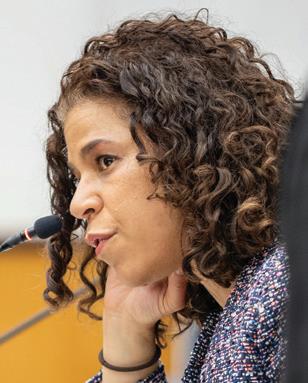
whether the agreement received approval from the RRHA Board and could lead to Council hearings and a vote on the redevelopment plans. Its introduction drew criticism from Gilpin residents, housing advocates and Council members over RRHA’s approach and methods for building support.
“We are not trying to stop redevelopment,” said 5th District Council member Stephanie Lynch. “We are trying to delay displacement because that is what will happen if we were to allow this to move forward.”
In an interview, Nesmith called the resolution’s arguments a “gross misinterpretation of the law” that he said would be resolved through ongoing discussions between city and RRHA attorneys.
Nesmith also disputed the idea that
kin he had been trying to engage with city officials since April to verify Richmond’s payment will occur. Horowitz said the city hasn’t even agreed to a meeting to “discuss the matter” and hasn’t responded to a June 17 letter addressed to Avula and City Attorney Laura Drewry.
In that letter to the city, Horowitz said Grimm would not waive his rights to sue the city for compensatory damages until his legal team received confirmation the city would make its matching payment.
“Having suffered through 45 years of wrongful incarceration followed by an additional 5 years of suffering with the restrictions related to being included on the Sex Offender Registry — all the result of the wrongful misconduct of Richmond and Commonwealth Officials — justice demands that Mr. Grimm be promptly paid the compensation to which he is entitled,” Horowitz wrote to Youngkin.
“The Commonwealth has promptly met its statutory obligation, but Richmond has not. After patiently waiting for the legislative process to conclude following his exoneration more than a year ago, this 70-year-old man should not be subjected to further delay due to Richmond’s failure to meet — or even to acknowledge — its obligations.”
This story originally appeared at TheRichmonder.org.
the agreement was made without RRHA Board approval, as well as claims made by residents and advocates during the meeting, and emphasized the authority’s legal rights in handling RRHA-controlled communities.
“RRHA as a housing authority is obligated to obtain City Council approval to adopt a redevelopment plan when the authority is seeking to create a redevelopment area,” Nesmith said.
“That is distinguished and different from [when] RRHA redevelops its own “Big Six” HUD communities.”
Council President Cynthia Newbille, meanwhile, said she hopes for prompt clarity, discussion and resolution of the matter with RRHA to ensure efforts to improve conditions for public housing residents continue moving forward.
“At the end of the day, we will still need to get to the table,” Newbille said. “We have major public housing communities across this city and all … are of concern to me.”
By Sophia Tareen and Jeff Martin Associated Press
A Florida police officer
had his gun aimed at a Black college student shortly before the driver was pulled from his car and beaten in a recorded encounter that recently sparked widespread outrage, civil rights lawyers said Tuesday.
The officer standing in front of William McNeil Jr.’s car appeared to have the 22-year-old at gunpoint as another officer shattered his windshield and began dragging him from the vehicle, according to body camera footage. Civil rights attorney Ben Crump and other lawyers presented a still image from the video during a news conference in Chicago.
They called it one of several discrepancies from initial police accounts, called for the officers involved to be fired, and said a federal lawsuit is being prepared.
“Read the police report. Watch the video. And see if they are telling the truth,” Crump said. “They don’t add up.”
McNeil says he was traumatized and injured Footage from a camera mounted inside McNeil’s car shows glass shards flying into his chin as he sat still.
An officer then struck him in the face and punched him in the head seconds after he was pulled from the vehicle.
A police report says he was punched six more times in the hamstring after being knocked to the ground.
Crump and other attorneys for McNeil said they believe the Jacksonville Sheriff’s Office has not released all available video footage.
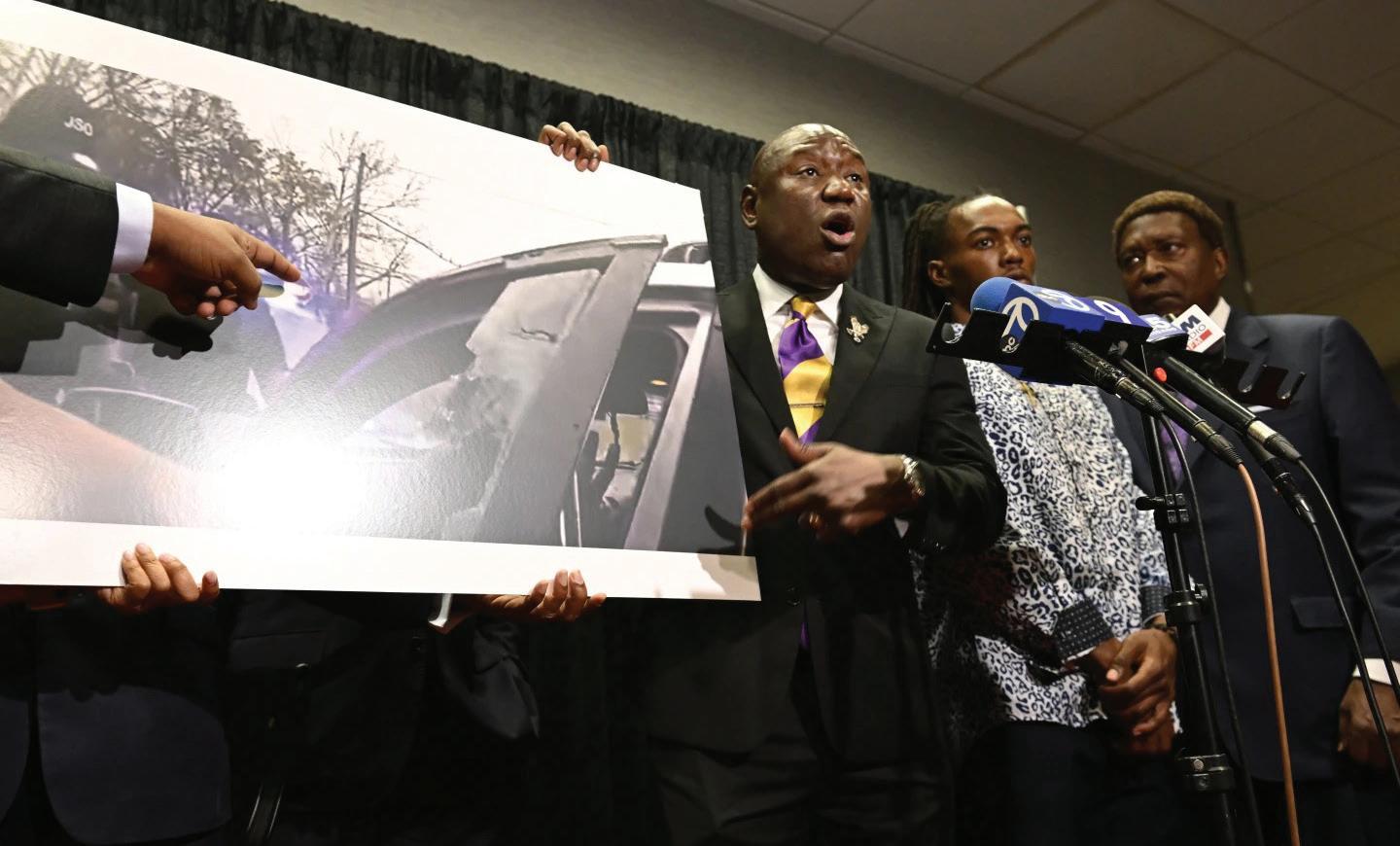
Lawyers say officers withheld video
Last week, the sheriff released body camera footage from two officers at the scene.
On Tuesday, Crump accused the department of selectively releasing footage to “explain away what happened.”
“We know there are other videos that exist that we do not have,” he said. “We don’t think this is the only officer who drew his gun.”
The released footage shows at least five officers near McNeil as he was dragged from the car and handcuffed on the ground.
A third officer’s bodycam video — also released — only shows officers searching McNeil’s car after the arrest.
Much of what happened during the physical altercation is difficult to see in the released footage due to the close proximity and limited camera angles. Some of the alleged actions occurred outside the bodycam frame.
Ahead of the news conference, Crump led a prayer with McNeil and his mother.
“That day I was telling the truth,” McNeil told reporters. “I was being held at gunpoint and I didn’t feel safe.”
A spokesperson for the Jacksonville Sheriff’s Office said Tuesday that “due to pending litigation, we would
McNeil said the ordeal left him traumatized and with a brain injury. He required stitches after a tooth broke and pierced his lip, according to his attorneys. He and his legal team spoke during the annual convention of the National Bar Association, the nation’s largest organization of Black attorneys and judges.




be unable to speak further on the incident.”
Sheriff says video lacks full context
After McNeil’s video of the Feb. 19 traffic stop gained millions of views online earlier this month, Jacksonville Sheriff T.K. Waters disputed claims made by the legal team.
Waters, who is Black, said McNeil had been repeatedly told to exit the vehicle. Though McNeil initially had his door open while speaking to an officer, he later closed it and appeared to keep it locked for about three minutes before officers forcibly removed him, the video shows.
Waters said the footage from
the in-car camera “does not comprehensively capture the circumstances surrounding the incident.”
“Cameras can only capture what can be seen and heard,” he said during a news conference in Florida last week. “So much context and depth are absent from recorded footage because a camera simply cannot capture what is known to the people depicted in it.”
McNeil had been pulled over for allegedly not having his headlights on during inclement weather, although it was daytime, his lawyers said. Crump claimed the sheriff’s office uses headlight violations as a pretext for stopping Black








drivers. He said his team found that Jacksonville officers cited 78 motorists for the violation in the past three years — 63 of them were Black.
Police report claims McNeil reached near a knife
A disputed point in the police report is the claim that McNeil reached toward the floorboard, where deputies later found a knife during a post-arrest search.
“The suspect was reaching for the floorboard of the vehicle where a large knife was sitting,” Officer D. Bowers wrote.
“Even when he was handcuffed, they repeatedly slammed his head to the concrete,” Crump said.
Shortly after the arrest, McNeil pleaded guilty to resisting an officer without violence and driving with a suspended license, Waters said. The State Attorney’s Office determined the officers did not violate any criminal laws. An internal investigation is ongoing.
McNeil is a biology major and a former marching band member at Livingstone College, a historically Black college in Salisbury, North Carolina. The arrest occurred in February but gained attention only after McNeil’s in-car footage went viral this month.
But Crump said video shows McNeil “never reaches for anything.” A second officer noted in his report that McNeil kept his hands up as Bowers smashed the window.














Several years ago, we witnessed a personal racial reckoning by our governor, Ralph Northam, who, after remembering the time he wore blackface as part of a Michael Jackson costume, came to understand how wrong that was. This awakened version of our state leader went on to create a cabinet-level position to address systemic racism, invest in HBCUs and oversee the removal of the Robert E. Lee statue from Monument Avenue. We appreciate the former governor’s desire to become a better human being, and we trust that his journey has continued as he has reentered the private sector.
While we couldn’t have predicted Northam’s change of heart, we definitely would’ve wagered against our current governor, Glenn A. Youngkin, becoming a social justice warrior. We might still win that bet, but the businessman from Great Falls had us doing a bit of a double take this week, when he took a stand for a man who was wrongfully committed and spent more than 40 years in jail.
At age 20, Marvin Grimm Jr. was wrongfully convicted in 1976 of murdering a 3-year-old child. He says he was forced to confess. Grimm was sentenced to life in prison, plus additional time on the sex offender registry. He was exonerated in 2024 after DNA and toxicology testing conclusively excluded him from involvement in the crime.
In 2025, the Virginia General Assembly approved House Bill 1776, awarding Grimm $5.8 million in state compensation for the injustice he endured. Richmond stepped up, too, matching that amount and doubling the total to $11.6 million. Grimm deserves both justice and compensation, and our governor appears willing to go to great lengths to ensure he receives the latter.
This week, the governor threatened, via a letter to the mayor, to withhold state funding to the City of Richmond unless it paid its share of compensation to Grimm. The state’s funding is crucial to the operation of the city’s schools, police department and infrastructure maintenance. Quite a bold stance. I guess if you’re going to jump in the activist pool, you might as well make a big splash. But wait a minute …
Where was the governor last week, when two African American men, Ferrone Claiborne and Terence Richardson, celebrated their release from prison from being accused of the murder of a police officer? He certainly wasn’t at the event held in their honor, which signaled the start of their new lives as free men. You’d think with his newfound desire to pursue justice for the innocent, he would’ve been front and center or at least have sent a nice letter.
Perhaps he realized that his presence might have been a little awkward — for him. Instead of advocating for the release of the two men from Waverly, the governor has a history of doing the opposite. He criticized President Biden for granting Claiborne and Richardson clemency and being acquitted of the murder in court; he and the current attorney general still seem to want to hold them responsible.
Although both cases involved a murder, allegations of coerced confessions and decades behind bars, what happened to the Waverly Two and to Marvin Grimm Jr. is not exactly the same. And neither, it seems, is the governor’s response. Perhaps if he hadn’t “restructured” the state’s DEI office, someone there might have helped him see the disparity in optics.
What message does it send when a white man walks away with $5.8 million and a strongly worded letter from the governor, while two Black men are still waiting for the state to admit they were ever wrong? The details of the cases aren’t identical, but the difference in response is hard to miss. Maybe it’s an oversight. Maybe it’s something else.
We’re glad the governor went to bat for Marvin Grimm. That was the right thing to do, although his approach was heavy-handed. But that’s often how activists start out. There’s still time for our governor to prove that he’ll advocate for justice for everyone, not just people who look like they probably voted for him.



A common Republican talking point is that Democrats can’t be trusted to manage major cities. Donald Trump and his Republican allies can barely hide their disdain for Democrats of color leading America’s largest cities. They deride these mayors as “DEI” hires who want lawlessness and crime to run rampant while their cities decline. Look no further than the immediate attacks on Zohran Mamdani following his primary win in New York City. Trump Republicans — and quite frankly too many Democrats — immediately railed against Mamdani as a socialist who would destroy New York should he win the general election. But if Democrats want to start winning again and attract working-class voters, they would be wise to lean into the lessons Democratic mayors teach us. Democratic sniping since Mamdani’s victory is causing the party to lose sight of the bigger picture.
Mamdani was wise to focus on meeting New Yorkers where they are and engaging nontraditional voters with a crisp, consistent message on how life is only getting more expensive. His message offered a strong contrast as Republicans double down on policies that will ex-
acerbate the affordability crisis facing working-class Americans. And for those who can’t vibe with Mamdani because of his proud Democratic Socialist affiliations, consider two mayors from the Democratic main -
stream. Birmingham, Alabama’s Randall Woodfin and Baltimore, Maryland’s Brandon Scott have built impressive records on crime reduction, economic revitalization and blight elimination.
Each knows working-class voters judge Democrats not by rhetoric, but by their track record: Can you make my street safer? Can you bring jobs to my neighborhood? Can you keep my rent from skyrocketing?
These mayors have married progressive populism with results-oriented pragmatism. They like to make their points by getting
things done. Each understands that progressive positions without delivering results won’t win back the working class. In the South, we call this plain common sense.
By focusing on commonsense results, Mayors Woodfin and Scott dispel Republican tropes about Black leadership and Democrats’ ability to deliver for the working class. They show Democrats know how to run government. Images of both doing the work as dedicated young Black fathers further suspend the notion that Black men are to be feared, lack work ethic or aren’t serious about their families and communities.
Scott has reduced homicides to a 50-year low without starving the government or defunding the police. Similarly, Woodfin has reduced violent crime by investing millions into crime prevention while boosting incentives for police officers.
Both mayors are offering life coaching, job placement, mental health services and safe alternatives alongside effective police enforcement.
They are investing in people through blight elimination and true economic revitalization that centers the working class and their desire to live in safe, affordable and clean communities.
Their cities are thriving despite a Republican agenda at all levels of government focused on starv-
As if he didn’t have enough on his mind in late summer, President Trump has called on two professional sports teams to revert to their former names — which unfortunately sound to many ears like racial slurs. Is Trump just looking for trouble? Or is he whipping up controversy to direct atten tion away from other trouble that he is in?
Last Sun day on Truth Social, the so cial media platform he owns, Trump called on the NFL’s Washington Commanders and MLB’s Cleveland Guardians to go back to the team names they used before they rebranded in response to complaints about the use of Native American names and imagery.
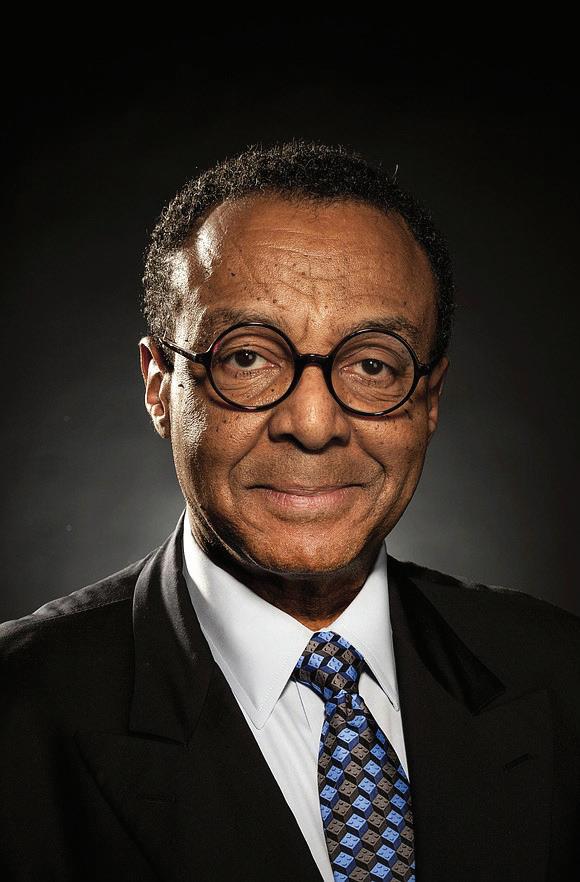
Referring to Washington team, Trump posted, “I may put a restriction on them that if they don’t change the name back to the original ‘Washington Redskins,’ and get rid of the ridiculous moniker, ‘Washington Commanders,’ I won’t make a deal for them to build a Stadium in Washington.” Moreover, he wrote, “Cleveland should do the same with the Cleveland Indians.”
Ah, the old one-two punch of bigotry and extortion.
For fun Trump added, “MAKE INDIANS GREAT AGAIN (MIGA)!”
Right. Somehow, I don’t expect Indigenous Americans to be very impressed by his demand.
But I suspect this interlude is merely a message to his followers to remind them what binds the MAGA movement together.
Trump has freed them from the need to consider the feelings of people of other races and nations.
Trump has also willingly used the power of the presidency to attack the bureaucracy, the universities, the media, the arts — all of them full of “elitists” who have sought to impose their views on speech and thought about race.
Trump has the power, in word and deed, to hurt these people and institutions, and he glories in doing so.
That is the message to MAGA of these posts. But why now?
Trump is trying to move the news cycle past the mysteries surrounding the late Jeffrey Epstein. More news has emerged tying him to the late financier and convicted sex offender who died by suicide while in prison nearly six years ago.
The Epstein story took an unexpected turn earlier this month when the Justice Department announced that it would not release the so-called Epstein files, despite the fact that Trump surrogates had spent months, and in some cases years, making lurid promises to do so.
Then, the week before last, the Wall Street Journal reported that a risqué birthday letter sent to Epstein in 2003 bore Trump’s sexually suggestive signature. Trump went ballistic, suing the Journal, its owners and the reporters for $10 billion, contending that “no authentic letter or drawing exists.”
However, he sounded a bit more muted after the Journal’s subsequent report that Trump was briefed by his attorney general, Pam Bondi, in May that his name appears multiple times
in FBI documents related to the Epstein case.
The Epstein case is a grave vulnerability for Trump. A segment of the MAGA movement is rebelling at his attempts to quash publication of the “files.” Trump in turn is accusing these people of being “duped” by Democrats. He called those who continue to demand the release of the files “weaklings.”
Meanwhile, the White House has been digging deeply into its repertoire of treason accusations against former Presidents Barack Obama and Joe Biden, as well as his 2016 opponent, Hillary Clinton, complete with a fresh promise to prosecute all involved in the decade-old investigation of Russian interference in the 2016 election.
That’s our president! Always ready, when all else fails, to play the old hits like the familiar blame-the-media ploy. But blaming the messenger doesn’t seem to be playing as well as usual.
A CBS/YouGov poll published last Sunday found that 9 in 10 respondents think the government should release all of its information on Epstein. Republicans were split almost evenly on approval of the Trump administration’s handling of the controversy, though self-identified MAGA Republicans were more likely to say they were satisfied.
As one who has grown weary of the epidemic of conspiracy theories that boiled up in the wake of Barack Obama’s presidential campaign, I am amused to see the masters of MAGA get a taste of their own paranoid theories. But I am also deeply worried about what they will permit themselves to do to get out of the Epstein pickle.
The writer is a columnist for the Chicago Tribune.
ing services for the working class, as highlighted by Trump’s “Big Beautiful Bill,” which dramatically shifts resources away from the poor and working class toward the uber wealthy. Despite these headwinds, Mayors Woodfin and Scott continue delivering for their cities. They are demonstrating that for Democrats, the pathway back to power rests on a clear and concise message for the working class backed by actual results. The usual Republican attacks ring hollow for these two mayors because the results speak for themselves. They paint a clear contrast for the working class between effective Democratic governance and more chaos and brutal assaults by Republican policies. As Democrats assess the playbook for 2026 and 2028, they would be wise to look at the leadership and lessons from two of our brightest stars in Birmingham and Baltimore. The writers are Democratic strategists and co-host the “Maroon Bison Presents: The Southern Comfort Podcast.”




By Christine Condon
Ben Jealous, the former Maryland gubernatorial candidate turned Sierra Club executive director, is “on leave” from his post at the national environmental advocacy group.
The move comes after significant turmoil during Jealous’ tenure, which began in early 2023.
The Progressive Workers Union, which represents Sierra Club employees, has slammed Jealous for his management of the organization, citing several rounds of layoffs over the past few years and other labor disputes. It argues he has placed the nonprofit on unsure footing at a time when President Donald Trump’s (R) administration is loosening environmental regulations and targeting clean-energy projects.
Jonathon Berman, a spokesperson for the Sierra Club, confirmed Jealous’ leave but declined to comment further, calling it a “personnel matter.” It remains unclear why Jealous is on leave or for how long he will be absent.
In an email sent to Sierra Club staff Friday, Michael Parrish, the club’s chief operating officer, said a longtime Sierra Club higher-up, Loren Blackford, would serve as acting executive director in Jealous’ absence.
Erica Dodt, president of the Progressive Workers Union, cited recent layoffs in a news release Monday.
“When facing budget challenges, we have been told and believe that Jealous’ executive team increased its size and salaries all while laying off staff critical to the Sierra Club’s success,” Dodt said.
With Jealous on leave, the union looks forward to “working with managers and the Sierra Club Board of Directors to right the ship and to rebuild trust between the union, non-represented staff, and volunteers,” said Dylan Plummer, unit representative for the Sierra Club Unit of PWU.
The union issued a vote of “no confidence” in Jealous last year, and nonunionized Sierra
Club managers and certain chapters took the same step.
Between January 2023 and April 2025, the union estimates that the Sierra Club cut 97 staff positions. More recent announcements of upcoming layoffs would bring the total to 140, according to a June news release from the union, which represents 364 Sierra Club staff.
“The Sierra Club must be a strong leader against the Trump administration’s attempts to eliminate bedrock environmental policies and protections,” Plummer said. “It’s incomprehensible that the Sierra Club Board and executive leadership would again discard the very people who stand on the front lines every single day to carry out this work.”
Jealous, 52, was the Democratic nominee for governor in 2018, but lost overwhelmingly to incumbent Gov. Larry Hogan (R), despite running in a blue state. Hogan, who became only the second Republican governor in Maryland to win a second term, won 55.4% of

the vote to Jealous’ 43.5% in the general election.
Before his run with the environmental organization, Jealous made a name for himself as a civil rights leader, serving as the youngest-ever president and CEO of the NAACP from 2008 to 2013. After his gubernatorial run, Jealous led the civil rights organization People For the American Way, beginning in 2020.
But the Progressive Workers Union has charged Jealous, the
By David W. Marshall
first person of color to lead the Sierra Club, with laying off disproportionate numbers of staffers of color during his tenure. A 2023 layoff was almost half “Black, Indigenous, People of Color,” according to PWU, though BIPOC staff were about 28% of the organization.
The union has also filed charges with the National Labor Relations Board, including one arguing that its bargaining team leaders were being targeted for
layoffs because of their union activity amid contentious negotiations for a new contract.
Ben Jealous’ tenure at the Sierra Club “has been defined by unprecedented union busting, never-ending layoffs, and the demoralization of staff at the organization,” said CJ GarciaLinz, a Sierra Club employee and former PWU president, in the June news release. This story originally appeared on MarylandMatters. com.
the outcome as demonstrated by today’s Trump MAGA movement.
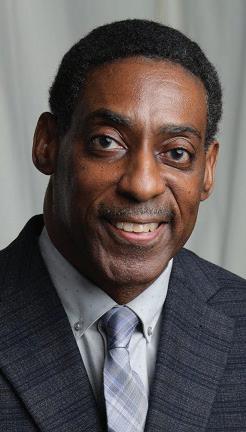
During the Reagan era, prominent figures of the Religious Right movement played a significant role in mobilizing conservative Christians and advocating for their political interests. While the movement was largely led by figures such as Jerry Falwell (Moral Majority) and Pat Robertson (Christian Coalition), younger individuals such as Ralph Reed and Paul Weyrich also played a key role in the movement’s organizational and political outreach. The younger leaders often focused on mobilizing support on the grassroots level, developing strategies for political engagement, and leveraging new media technologies to spread their message. Ralph Reed, as executive director of the Christian Coalition, was a major influence in mobilizing evangelical voters and influencing political discourse during the 1990s, thereby extending the reach of the Religious Right’s agenda. Paul Weyrich, as a key strategist, was co-founder of the Committee for the Survival of a Free Congress (now the Free Congress Foundation). He was instrumental in building the conservative infrastructure that supported Ronald Reagan. With white evangelical voters becoming mobilized and focused while working within a conservative infrastructure, their numbers and political influence grew over the years to become a formidable force and voting bloc. We see
Those of us who oppose the MAGA movement and its antiDEI agenda can learn a lot from the tactics used by Falwell, Reed and Weyrich, particularly how they made abortion a rallying cry for the Religious Right. Abortion became the most potent unifying issue in modern American politics. It became a defining issue as part of a long-term political and cultural strategy. Through mass
David W. Marshall
mailings, religious broadcasting and organizing conservative Christians, the Moral Majority and similar organizations reframed abortion not only as a moral but also a political issue that defines their movement. The Religious Right was strategic. Conservative evangelicals, Catholics and other groups built a broad coalition not primarily on theological terms but on the language of “human rights” for the unborn. Opposition to Roe v. Wade became both a symbol and an overwhelming priority of the movement’s vision.
The Religious Right transformed abortion into a litmus test for candidates and judges, shaping the Republican Party’s platform and the agenda of conservative movements for decades. Theologically and politically aligned churches became centers for grassroots organization, encouraging voter registration, political activism
and public protest. The Moral Majority mobilized millions of voters and influenced candidate selection and party platforms. The persistence paid off. After nearly five decades of sustained activism, the Supreme Court’s 2022 decision in Dobbs v. Jackson Women’s Health Organization overturned Roe v. Wade. This was the crowning achievement of a long campaign by the Religious Right.
The network of progressive churches should follow the Moral Majority blueprint. Where conservative Christians used abortion as their rallying cry, progressive Christians who believe in justice and fairness should use overturning anti-DEI measures as their unifying and defining issue to galvanize and mobilize voters. U.S. Rep. Ayanna Pressley, D-Mass., means business by giving progressive Christians the legislation they need as a rallying point. She introduced a bill in the U.S. House that would restore what advocates say are major setbacks to closing social and economic gaps for Black and other marginalized communities. “Their rollbacks have been swift and deep over the last six months, and all marginalized people are feeling the impacts,” Pressley told The Grio. She described the Trump administration’s antiDEI agenda as “anti-Blackness on steroids.” Pressley’s Equity in Government Act would restore policies former President Joe Biden established by executive order to expand equity efforts across the federal government.

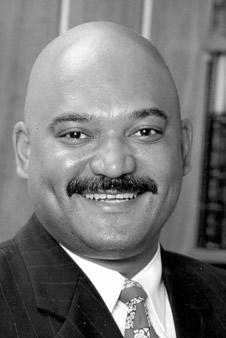
Executive orders 13985 and 14091 mandated that federal agencies embed equity in their everyday business, including tailoring services to ensure that they reach and improve the lives of Black and brown people, women, LGBTQ and disabled communities. The Biden administration’s DEI framework invested in programs and grants designed to expand access to housing, education, entrepreneurship, health care, voting and to reduce exposure to environmental harms and community violence. Biden described his equity orders as a “whole-of-government response” to the systemic harms caused by policy discrimination and bias. “There were gains being made,” Pressley said during a press conference promoting the Equity in Government Act. She also stressed the fact that “gains are not guarantees.” Despite Biden’s federal action to address systemic racism and bias, Trump on his first day in office rescinded Biden’s equity orders and banned all DEIrelated programs and policies. The Trump administration also pressured private industries, including universities and Fortune 500 companies, to follow suit. Pressley is fighting back and giving others the ammunition to join the fight. While we don’t have five decades to get this right, the bill can be a starting point leading into the midterm elections.
The writer is the founder of the faith-based organization, TRB: The Reconciled Body.
Dominion Energy will host an open house to inform the community of the Nine

By Mekhi Wilson
The Richmond Black Widows claimed their first Women’s Football Alliance Division III title with a 25-7 victory over the Oklahoma Rage on July 25 at Tom Benson Hall of Fame Stadium in Canton, Ohio.
Richmond finished the season undefeated at 9-0, powered by a dominant defense and standout special teams play. The team scored all four of its touchdowns in the championship game on defense and special teams, without an offensive score.
“Once I saw how we played together as a team, along with our chemistry on and off the field, I already knew we had a championship team,” said wide receiver Tatiana Johnson, who was named player of the game.
Johnson electrified early with an 82-yard punt return touchdown in the first quarter. The defense held strong through a scoreless second quarter, and Richmond led 6-0 at halftime.
Johnson added a pick-six touchdown in the second
half and finished with two interceptions. Linebacker Alix Barnette blocked a punt that was recovered for another score, and linebacker Marishia Berry added a late fourthquarter touchdown to help seal the win. While Berry plays offense, details on the scoring play were not specified.
Richmond’s defense limited Oklahoma to a single touchdown while the Widows finished the season having outscored opponents 249-37.
The win marked a major milestone for the team, which reached the Division III Championship in its inaugural 2016 season but lost 20-18 to the Acadiana Zydeco. Richmond also made a semifinal appearance in 2018.
“We built that sisterhood and strengthened our bonds, we started to trust each other, trust the coaches, and trust the process,” said LaToya Parrish, linebacker for the Black Widows. “We had some challenges over the past two years trying to get to where we are, and we never gave up, we never quit.”
As Division III champions, Richmond will move up and play in Division II in the 2026 season.
By Michael Marot Associated Press
Bubba Wallace spent three long years questioning everything about his racing world.
During a 100-race winless streak, he saw teammate Tyler Reddick win five times and post three top 10 finishes in NASCAR’s final standings. Wallace also watched team co-owner Denny Hamlin make regular trips to victory lane while still chasing his elusive Cup title.
The drought forced Wallace to contemplate what was wrong and whether he’d continue to be employed in racing — until he realized there was more to life than racing. Sunday’s life-changing Brickyard 400 title only reinforced that notion.
“When Amanda and I first started dating, I was like ‘Hey, racing [is] everything, right?’ I knew I made a mistake saying that,” Wallace said, referring to his wife Sunday night. “It took me all these years to realize this isn’t always going to be here. So I think it’s better to enjoy moments like this, but nothing can overcome the joyful times you have with your family.”
Those aren’t just empty words, either.
After celebrating with his crew, a jubilant Wallace hugged his wife and hoisted their 10-month-old son over his head, an image that may far outlive Wallace’s reign as champion.
His second family, other Cup drivers, also embraced Wallace following the biggest victory of his career. By becoming the first Black driver to win a major race on Indianapolis Mo-
tor Speedway’s historic 2.5-mile oval, Wallace also locked up his second playoff appearance.
But long before Sunday, there were indica tions Wallace was turning things around.
After posting just six top five finishes and 12 top 10s in his first five Cup seasons, Wallace broke through with five top fives and 10 top 10s in 2022 and 2023. Last year, he had career bests of six top fives and 14 top 10s. And he won one pole in each of those three seasons, too. He also won two qualifying races leading up to this year’s Daytona 500, though those wins don’t count in the Cup’s official stats.
Midway through last season, though, Hamlin noticed a change in Wallace.
“When I hired Bubba, I believed in his capability, not necessarily the results he had shown, but I understood his potential. And then there was a time where we were kind of wrestling with ‘Do I want it worse than him? I can’t make him want it,’” Hamlin said. “It just seems like something happened mid last year — maybe related to having a child or whatever — but something happened where I saw a change in attitude that changed work for him.”

than just racing, and it freed him up to alleviate some of the pressure he put on himself and the brutal self critiques.
It was a new perspective on life.
Suddenly, Wallace had more to think about
“I’m a guy with a beautiful wife, a beautiful son and putting family first, that’s all that matters and just fortunate enough to be driving race cars,” he said. “That makes things easier, gives you something to kind of focus on, the racing stuff is kind of secondary now and you have to have a mental shift to say that.”
But the philosophical change was only part of the equation.

Free Press staff report
Virginia Union University has tapped international tennis veteran Gabriel Kotto as the new head coach of the Lady Panthers tennis program.

Kotto brings decades of experience to the role, having coached junior players on the Pro Circuit from U14 to U18, along with leading varsity high school programs in both the U.S. and abroad. Under his leadership, Reston High School in Fairfax, Va., won the Liberty Division District title in 2010, while the International School of Kenya earned an Interscholastic School Championship in 2007.
Kotto holds a PTR Pro certification and a Master
of Tennis Performance Coaching degree with a focus on adult development. His coaching résumé includes running developmental clinics for adults in Reston, and producing players across all levels — from beginners to tournament hopefuls pursuing college scholarships or USTA rankings.
The USTA awarded Kotto with a Non-Cut Coach certification for his developmental work in both Virginia and Kenya. His 2007 developmental program was named the best in its category that year.
Kotto earned a diploma in physical education and sport science from the Kenyan Board of Education, with an emphasis on diet and high-performance training.
Free Press staff report
The Metropolitan Junior Baseball League’s 34th annual championships are underway in Richmond, with youth teams from across the East Coast competing through Sunday, Aug. 3. The event features a full slate of games in divisions for 12-under, 14-under, 16-under and 19-under boys, along with an 18-under girls’ softball championship. Richmond has hosted the MJBL’s flagship inner-city tournament since 2019. Participating teams hail from Virginia, Connecticut, the District of Columbia, Maryland, New York, North Carolina and Pennsylvania. Ahead of the tournament’s start, the 21st Annual Bobby Bonds Memorial Symposium was held Tuesday via Zoom. This year’s panel discussion, titled “Returning the Game to
Our Communities,” focused on how baseball and education can help address challenges facing youth in underserved communities.
Panelists included Tyrone Brooks, Major League Baseball’s senior director for front office and field operations; Will Boone, founder of Afro Blew Media Inc.; and Matisse Lee, associate commissioner for external partnerships and special projects at the Central Intercollegiate Athletic Association (CIAA). Paul Johnson of Pennsylvania served as moderator.
“We are extremely grateful to have this group of dynamic panelists to explain how baseball can benefit our youth and their communities,” Johnson said. Tournament play began Wednesday at Dorey Park with pool games starting at 1 p.m., followed by the Mike Berry Home Run Derby for the 16-under and
19-under divisions at 6 p.m.
Opening ceremonies took place at 7:30 p.m., featuring a ceremonial first pitch by the Rev. Roscoe Cooper, Henrico County’s 5th District representative. The day concluded with a featured 19-under matchup between Richmond’s VA Overlook Dawgs and the defending champions, the Heritage Rebels of Greenville, North Carolina. Championship games in the 12-under and 14-under divisions will be held Saturday at 5 p.m. On Sunday, the 18-under girls and 16-under boys will play their title games at 10:30 a.m., followed by the 19-under championship at 1 p.m. All games are at Dorey Park.
The top performer in the 19-under division will receive the Ken Free Most Valuable Player Classic Scholarship. All registered players are also being given free passes to Kings Dominion.
Crew chief Charles Denike, whose nine years in the U.S. Army showed him how to cope with pressure, added a calming influence on the radio. Wallace also started reading “The Daily Stoic,” a resource with exercises to help people cultivate wisdom and resilience.
Fatherhood changed things, too.
“I’ve got the family here,” he said. “Beck’s
win, officially his first race, and see his dad do it — get to victory lane — that brings me a lot of joy. Amanda’s here, we lost our grandmother Friday night, so it’s just kind of been a special weekend for us. Our family’s here in Indiana, so this is really cool to be able to do.” Of course, Wallace still gets frustrated as he did Saturday when he missed capturing the Brickyard pole by a whisker in qualifying. But he managed to strike a balance between the disgust that used to seep in and the positivity of what he nearly accomplished.
And it made a difference on the track Sunday and potentially off of it in the near future.
“There’s a certain level of expectation to win and so, not doing that for almost three years, you really start to doubt yourself and wonder, ‘Is this it after the contract’s up? Is this it?’” he said. “I’ve still got a couple of years left, so hopefully this gives another year at least.”

Free Press staff report
One of horse racing’s rarest outcomes took place Friday at Colonial Downs Racetrack when the day’s opening race ended in a “double dead heat” — a tie for first place and a tie for third.
While dead heats happen occasionally worldwide, a double dead heat is extraordinarily rare, especially since the advent of photo-finish technology. Since 1990, records show just 15 double dead heats for first and third in more than 2 million races run across North America.
“I’ve been in the racing
business for more than 20 years and this was definitely a first for me,” said Frank Hopf, senior director of racing at Colonial Downs. In Friday’s $70,000 maiden special, Magic Wallet, ridden by Victor Carrasco, and Sometime, ridden by Axel Concepcion, finished in 1:04.59 to share the win. Birdy Whisper, ridden by Johan Rosado, and Smols, ridden by Gavin Ashton, tied for third, finishing in 1:06.34. Birdy Whisper and Smols are stablemates, owned and trained by Carlos Munoz of CM Thoroughbreds.
The unusual finish created a
complex payout for bettors, with two winners, two exacta results (picking first and second), four trifecta results (picking first, second and third) and four superfecta results (picking first through fourth). Colonial Downs is preparing for its Festival of Racing on Aug. 9, which will be the biggest day of racing in Virginia history, featuring more than $2.5 million in prize money. Tickets, including $5 general admission, are available at ColonialDowns.com). Racing continues Wednesday through Saturday until Sept. 13, with a special card on Labor Day.
Growing up in Richmond felt magical for Lexi Cleveland, surrounded by a tight-knit extended family and the city’s deep historical roots. She remembers a childhood shaped by the presence of her great-grandmother and all of her grandparents, who shared stories from their lives and the past.
“Everyone in my family lived in Richmond,” Cleveland said. “It made the city feel like home. Growing up in Richmond sparked my love of history. Historic markers are everywhere — you can’t escape our history.”
Although Cleveland was born in Richmond, her family relocated to Cheyenne, Wyoming, for her father’s military service. A strong sense of family ties brought them back to Richmond a few years later.
She attended Hermitage High School, riding the bus every day from Varina to take advantage of the school’s special programs. She later studied at the College of William & Mary. After graduation, she worked in Colonial Williamsburg, a natural fit for someone with a bachelor’s degree in history and a deep passion for the subject.
Although she loved the work, the pay wasn’t enough to make ends meet. Cleveland began exploring graduate programs and found that studying abroad was more affordable than taking online classes in the U.S. She enrolled in Leiden University in the Netherlands, studying American history from a European perspective. Her experience there brought both culture shock and valuable insight.
“People abroad think all American history starts and ends in Boston,” she said. “They don’t know much about Virginia at all. Also, in the Netherlands,
I was just Lexi the American and not Lexi, the Black girl.”
After completing her graduate studies, Cleveland began working with ARtGlass, a company that specializes in augmented reality storytelling for cultural sites, museums and historic attractions. She stumbled into the role after working as an executive assistant at a law firm. ARtGlass offered her a new path, and she’s now part of the leadership team there.
“I use smart glasses to make holograms to engage people with history,” Cleveland said. “It combines technology and my love of history.”
When she’s not promoting Richmond’s history, Cleveland enjoys bird-watching and experimenting with seed blends to attract different species. She also visits museums and historic landmarks whenever she travels.
What is Historic Richmond?
We are an organization dedicated to protecting and promoting the things that make Richmond, Richmond. Beyond just buildings, it helps to preserve and promote the unique communities, landscapes and stories that make Richmond truly unique. We’re located at 4 E. Main St., Suite 1-C.
What is Historic Richmond’s mission?
Our mission is to shape the future of Richmond by preserving our diverse historic buildings, neighborhoods and places, sparking revitalization and championing our distinctive architectural legacy.
Who are the founders of Historic Richmond?
Mary Wingfield Scott, Isobel Witt, Elisabeth Scott Bocock, Catharine (Kitty) Dennis and Louise Catterall.
Why did they create the organization?
To preserve historic build-

ings threatened by immediate demolition, including many in Church Hill and the Adam Craig House in Shockoe Bottom.
How did you get involved?
I saw a post on the Richmond Reddit board in the fall of 2016, looking for Junior Board members. When I discovered that it was the organization that saved some of my favorite buildings, including the National and Old City Hall, I was excited to contribute.
When were you elected Junior Board president? In the fall of 2024.
What is your top goal as Junior Board chair?
I want to help everyone on the Junior Board utilize our time and talents to engage the community and get excited about Richmond’s fantastic history, and to have fun while doing it!
What is your strategy for building community engagement and excitement?
We host numerous events throughout the year that com-
bine education, advocacy and fun. Every month, we host an event called Quoit Club, where we provide a tour, food, drinks and conversation. We cover a variety of topics, highlighting the many unique buildings and communities that make up the city. We also host trivia nights, tabling events and more. What’s your biggest challenge?
I think people often have preconceived notions about history and preservation, and they may struggle to see themselves reflected in it. However, Black communities, LGBTQ+ communities, women, immigrant communities and others have all made significant contributions to this city throughout time and their histories are all across the landscape.
What’s the distinction between the board and the Junior Board?
The Junior Board is for folks under 40. We host events and fundraise, but the board is responsible for steering the organization, including the Junior Board and other auxiliary groups. I am also on the board, so I act as a liaison.
How has Historic Richmond made a difference in Black communities?
Historic Richmond has done a great job in promoting stories of Black neighborhoods and historic sites. Historic Richmond has also helped fund initiatives that make a difference, such as the façade grant program, which helps homeowners restore their houses and maintain the neighborhood’s integrity. It has also helped host and sponsor a monthly happy hour for Black historic preservationists,
historic site staff members and people from various industries who are interested in promoting and protecting Richmond’s Black history.
How can the City of Richmond do a better job of historic preservation in all communities?
It is crucial for the city to pass the Cultural Heritage Stewardship Plan. This would be the first-ever city-wide plan to comprehensively identify, recognize and safeguard valuable historical and cultural community assets. The Black community and other marginalized communities have frequently had their histories ignored and erased; this plan would go a long way toward correcting this disparity.
What are the Golden Hammer Awards?
Since 2000, the Golden Hammer Awards have honored excellence in neighborhood revitalization projects throughout Greater Richmond. Recognizing professionals and community members improving our neighborhoods through restoration, adaptive reuse, new construction, placemaking and historic preservation.
How can readers submit projects for Golden Hammer Award consideration?
You can submit your projects on our website at historicrichmond.com/goldenhammerawards by Aug. 10 at 11:59 p.m.
What upcoming events does Historic Richmond have?
This is our 90th anniversary, and we’ve planned a week of celebrations from Oct. 13-17.
Events include everything from a city-wide restaurant day to a gala at the Hippodrome. For more details, please visit historicrichmond.com.
How do you start the day?
I try to start my day with a
few minutes of quiet meditation. I find this very grounding, and it helps me walk into the rest of the day feeling confident and centered.
What are three words that best describe you?
Curious, industrious and creative.
Who is your dream dinner party guest?
My paternal great-greatgrandmother. There is so much family lore about her. I would love the chance to meet and speak to her.
What are the top three on your musical playlist?
Given the current state of the world, I’ve been pretty moody, so it’s been a lot of Chopin. Billie Holiday is also an evergreen favorite. I enjoyed the soundtrack from the movie “Sinners.”
What is something you love to do that most people would never imagine?
Bird-watching. Big, small, common, rare, I adore birds.
What’s a quote that inspires you?
“For God hath not given us the spirit of fear; but of power, and of love, and of a sound mind,” 2 Timothy 1:7.
What book influenced you the most?
“Parable of the Talents,” by Octavia Butler. It’s a story about survival in difficult times and, unfortunately, feels quite prescient.
What are you reading now?
“The Sum of Us,” by Heather McGhee. We still have a lot of work to do if we want to build an equitable society that meets the needs of all its people, but perhaps, if we are determined, we can overcome them. What’s your next goal? I want to try to be better about balancing my many hobbies and interests as well as getting enough sleep.



Free Press staff report
Two new exhibitions at the Branch Museum of Design in Richmond showcase striking contrasts in motorcycle design — from gritty, one-of-a-kind builds to sleek, stylish scooters.
“Ruined,” curated by John Ryland of Richmond-based Classified Moto, fills the museum’s Long Gallery with the raw, industrial creations that have made his shop internationally known. Ryland said he embraces criticism from motorcycle purists who accuse him of “ruining” factory bikes — to him, it’s a sign that he’s turned something ordinary into something memorable.
Among the featured works is the motorcycle Ryland built in 2014 for AMC’s “The Walking Dead.” Created for the character Daryl
Dixon, portrayed by actor Norman Reedus, the custom bike appeared in network promotions and at events including San Diego ComicCon. Visitors to “Ruined” will have the rare opportunity to sit on the original screen-used bike and take photos.
In the museum’s Main Gallery, “Refined: The Design of Vespa,” traces the evolution of the iconic Italian scooter from its 1946 debut to its lasting influence on global design and culture. The exhibit features vintage Vespa models, original advertising materials, and pop culture artifacts, including the 2025 limited-edition Vespa 946 “Snake,” released in celebration of the Chinese zodiac year.
Both exhibitions run through Aug. 31 For more information, visit branchmuseum.org.

Free Press staff report
Richmond’s 804 Day returns to Shockoe Bottom on Saturday, Aug. 2, bringing a free outdoor music and community festival to the 17th Street Market.
Running from 12:30 to 6:30 p.m., the event will feature 10 Richmond-based acts performing across three stages. This year’s lineup includes Nickelus F (hip-hop), Kadencia Orchestra (Latin), Høly River (folk),
REIN (pop/rock), the Weldon Hill Quintet (jazz), Bucko (honky-tonk/goof-rock), Los Hermanos Alacranes (rock/ Latin), Flora and The Fauna (punk), Kaay Taurus (R&B) and Vexine (Southern rock noir).

Park gets a fresh start

In addition to live music, the festival will offer food and drinks, a Kids Zone, arts and crafts, more than 50 community vendors and a showcase of Richmond-focused nonprofits. Admission is free.
Organizers say the event has moved from Friday to Saturday this year to make it more accessible to the public. The inaugural 804 Day in 2023 drew an estimated 5,000 people.
The festival is presented by the City of Richmond and Shockoe Records, with support from Venture Richmond, the Virginia Tourism Corporation, WNRN, The Shockoe Partnership and Virginia Credit Union. It will take place between 16th and 17th streets, from East Main to East Grace streets. Street closures will be in effect.
More information is available at shockoerecords. com/804day.



Free Press staff report
Craft beer enthusiasts will have the chance to sample brews from across the state when the Virginia Museum of History & Culture hosts its eighth annual Virginia Brews festival on Saturday, Aug. 2.
The event, part of Virginia Craft Beer Month, begins at 6 p.m. and will feature more than a dozen breweries, along with live music from the band Night Allowance and food from vendors including 1115 Mobile Kitchen, River City Wood Fire Pizza and Cocina Calle.
Festival admission includes eight 3-ounce tastings, a commemorative glass, and access to all museum exhibitions, including “Un/Bound: Free Black Virginians, 1619 – 1865.”
This year’s festival will also include demonstrations by Marshall Scheetz of Jamestown Cooperage, who will showcase traditional barrel-making techniques. Scheetz, an independent scholar, specializes in historical reproductions and the study of cooperage from the 18th and 19th centuries.
General admission tickets are $45. Designated driver tickets are $12. For more information, visit virginiahistory.org.


Hundreds attend the American Muslim Heritage Celebration and the Ayida exhibition at the Institute for Contemporary Art at Virginia Commonwealth University on July 26. The event featured cultural displays, henna, flag face painting, videos on the history of Islam in America, food and a designated prayer space.

Free Press staff report
A new exhibition exploring the history and contributions of Black Catholics in Virginia is now on view at the Black History Museum & Cultural Center of Virginia.
The exhibition, “Faith & Resilience: The Legacy of Black Catholics in Virginia,” opened July 11 and runs through Nov. 22. It was developed in partnership with the Catholic Diocese of Richmond’s Office for Black Catholics and features artifacts from both active and closed Black Catholic churches and schools across the state.
“This exhibit highlights generations of dedicated Black Catholics who kept their faith alive, even amid hardship,” said Father Tochi Iwuji, director of the Office for Black Catholics. “It’s more than history; it’s a sacred testament to the spirit of a people and the lasting strength of faith. ‘Faith and Resilience: The Legacy of Black Catholics in Virginia’ invites us to honor a legacy built through struggle and blessed by hope.”
The opening of the exhibit coincides with the 140th anniversary of the founding of St. Joseph Catholic Church, a historically Black parish that was closed in 1969 during parish integration efforts. Today, St. Joseph Memorial Park stands in its place in Jackson Ward, just three blocks from the museum. The memorial houses the church’s original bell and honors the church’s legacy of inclusion and perseverance.
“BHMVA is dedicated to preserving and telling the history of Black Virginians, and the stories about the impact of the faith community are an integral part of our history,” said Shakia Gullette Warren, the museum’s executive director. “Our partnership with the Catholic Diocese of Richmond’s Office for Black Catholics is a wonderful opportunity for us to inform and educate museum visitors in a way people outside of the faith may not have previously known about or understood about Black Catholicism.”
As part of the exhibit, the museum will host a three-part speaker series open to the public. The series will cover a range of topics highlighting key aspects of Catholic faith and the experience of Black Catholics in Virginia.
For more information, visit blackhistorymuseum.org.






